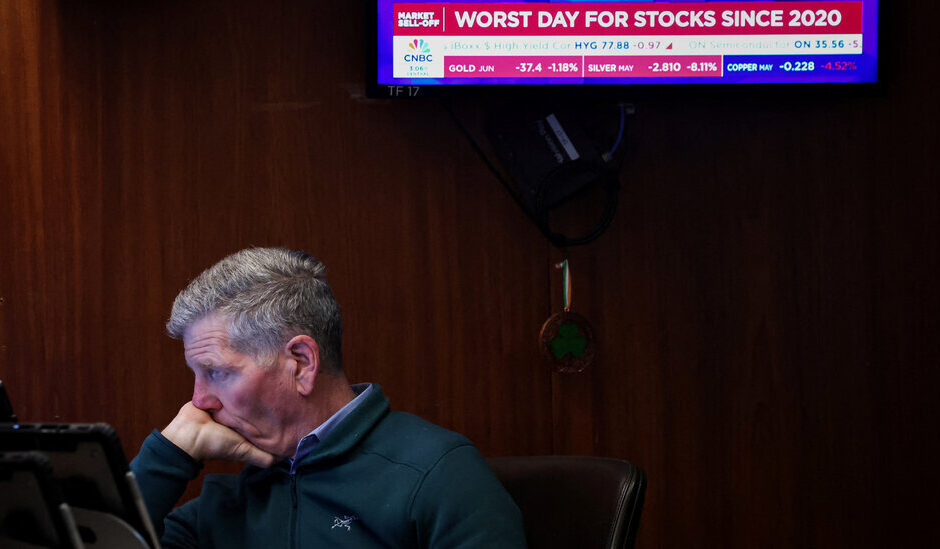Watching the tariff fallout
Investors are bracing for another nerve-racking ride after Thursday’s sell-off vaporized $2.5 trillion from the S&P 500 on fears of trade wars, a resurgence in inflation and a chill in global growth.
S&P 500 futures are sinking Friday, after the benchmark index limped through its worst one-day decline since 2020, at the height of the coronavirus pandemic. Stocks in Asia and Europe are down, too.
Just in: Beijing said it would impose an additional 34 percent tariff on U.S. imports next week, a move that further rattled investors. The yield on the 10-year Treasury bond plummeted below 4 percent on concerns that tit-for-tat moves would plunge the economy into a recession.
A new test is coming on Friday, with the jobs report set for release at 8:30 a.m. Eastern.
Tariff jitters are front and center again after President Trump signaled a new round of levies on semiconductors and pharmaceutical imports. Shares in Novo Nordisk, the Danish maker of the weight-loss drugs Ozempic and Wegovy, fell sharply in Copenhagen on Friday.
What to watch: The labor market has been an economic bright spot. But layoffs have spiked recently, with employers increasingly citing the “DOGE impact,” a reference to Elon Musk’s government-cutting work. Economists predict that Friday’s jobs report will show an additional 125,000 positions created last month, down from the 151,000 added in February, according to FactSet.
A lackluster jobs number could bolster traders’ bets on more interest-rate cuts. The futures market on Friday saw the Fed lowering borrowing costs four times this year, a doubling from predictions in January. (Others are doubtful: Morgan Stanley sees no cuts this year, while Nomura sees one.)
Wall Street is awaiting what Jay Powell has to say. At 11:25 a.m. Eastern, the Fed chair is expected to deliver his first public remarks since the introduction of reciprocal tariffs.
The big question: Does Powell still see the tariffs’ ill effects on inflation and growth as “transitory”?
Tariff uncertainty risks chilling investment. “Trump’s tariff plan probably represents a shift for markets to quickly move from max uncertainty to max pessimism,” Jeff Buchbinder, the chief equity strategist for LPL Financial, told The Times.
President Emmanuel Macron of France even called on European companies to pause their U.S. investment plans. “What would be the message of having big European players that invest billions in the American economy at the same time they are hitting us?” he said.
As tensions rise, stocks are falling. Seventy-four companies in the S&P 500 sank at least 10 percent on Thursday, according to Deutsche Bank’s count, including blue-chip businesses like Nike and Dell. Apple fell by more than 9 percent, a sign of how the Trump tariffs could upend companies’ global supply chains.
Shares in investment giants like KKR, Apollo Global Management and Carlyle Group plummeted, too.
Don’t expect the market tumult to force the White House to back off, some say. “I think the prospect of a ‘Trump put,’ whereby Trump would reverse course, is low,” David Seif, Nomura’s chief economist for developed markets, told DealBook. Most of the tariffs, he added, “are here to stay for the foreseeable future.”
Trump himself played down Thursday’s chaos. “The markets are going to boom, the stock is going to boom, the country is going to boom,” he said before a flight to Florida, where one of his golf clubs is hosting the LIV Golf Miami tournament. He said he was open to cutting deals — but only if the offers were “phenomenal.”
HERE’S WHAT’S HAPPENING
Shares in Intel rise after a report about a potential partnership with TSMC. Intel’s stock climbed 2 percent on Thursday after The Information reported that the embattled U.S. semiconductor company had reached a preliminary deal to create a joint chip-making venture with Taiwan Semiconductor Manufacturing Company, one of Intel’s biggest rivals. TSMC would take a roughly 20 percent stake. The Trump administration has encouraged talks between the two to shore up Intel.
The E.U. readies stiff penalties against Elon Musk’s X. The bloc is preparing to punish the billionaire’s social media platform for violating the Digital Services Act, a broad law meant to combat illicit content and disinformation, The Times reports. Any charges could escalate tensions between Brussels and Washington: American tech companies have complained about the aggressiveness of the bloc’s regulations, a grievance echoed by the likes of Vice President JD Vance.
President Trump orders the ending of the de minimis exemption. The president said his decision to close the loophole, which allows retailers to send clothes and goods from China directly to American shoppers without paying tariffs, was tied to efforts to crack down on shipments of fentanyl to the country. But critics of the move said that U.S. consumers could end up paying higher prices and that small- and medium-size American retailers could be hit.
Brown is the latest university to suffer a federal funding freeze. The Trump administration plans to halt $510 million in government contracts and grants to the Ivy League school for what it says is a failure to combat antisemitism on campus, The Times reports, continuing a campaign against higher education institutions. The administration has also sent a list of demands to Harvard for ending a government review of $9 billion in funding.
A big win for a $35 billion banking deal
It might just be possible to close a merger under the Trump administration after all.
Capital One cleared a significant obstacle to its proposed acquisition of Discover Financial Services after the Justice Department said it didn’t see sufficient competition concerns to block the deal, Lauren Hirsch and Danielle Kaye were first to report.
The $35 billion deal, announced in February 2024, would unite two of the nation’s largest credit card companies. The Fed and the Office of the Comptroller of the Currency could still block the deal, but analysts had expected the Justice Department to be the most likely of the three regulators to object.
The merger would create a banking giant. Capital One, with $479 billion in assets, is the nation’s ninth-largest bank. Acquiring Discover would give it access to a network of 305 million cardholders and add to its base of more than 100 million customers.
The banks argue that the deal would make Discover a stronger rival to the leading payment processing networks, Visa and Mastercard.
Officials had questioned the deal’s effect on credit card holders with low credit scores. Together, the two banks control around 30 percent of the $220 billion subprime credit card market, according to analysts at Jefferies.
Last year, the New York attorney general, Letitia James, announced that she was starting an investigation into the proposed transaction because of concerns about its potential effect on subprime customers. On Thursday, Senator Elizabeth Warren, Democrat of Massachusetts, reiterated her warning that such a combination would create “big payouts for executives, higher costs for consumers and small businesses.”
The banks argue that adding up parts of the subprime market doesn’t tell the whole story. Customers, for example, can have multiple credit cards. And there are alternatives like “buy now, pay later” products and installment loans.
It’s a change from the Biden era. The Justice Department under the previous administration told regulators that it had concerns about the deal. But the department’s investigation into the transaction was still active when President Trump took office, and the Justice Department found that there weren’t sufficient issues to block the merger.
Despite a surprising level of consistency between the two administrations on antitrust, they may differ on some key industries, like banking.
“This would identify that this administration is more open to bank mergers than the Biden administration,” Todd Phillips, an assistant professor of law at Georgia State University, told The Times. “When people thought of the Trump administration as being friendlier to business, this is the type of thing they were thinking of.”
Seen and heard, tariff edition
As boardrooms and trading desks were caught off guard by President Trump’s wide-ranging tariffs, vulgarities and superlatives screamed across Wall Street. Here’s some of what people said.
On tanking stock prices:
“Oh, really? Oh shit, OK. I just looked at the screen. I hadn’t looked at it. It got hit when I think the tariff came out and everybody can see in our 10-K where we’re sourcing from.”— Gary Friedman, the C.E.O. of the luxury home furnishings company RH, remarking on the company’s stock price during an earnings call shortly after Trump announced his tariff plan. (More than two-thirds of the company’s goods are sourced from Asia.) RH’s stock dropped as much as 40 percent as the call went on, making it one of the worst days in the company’s history as a publicly traded business.
It’s just temporary:
“If a 9th grader in high school presented this tariff chart to a teacher in a basic economics class, the teacher would laugh and say sit down and work on the assignment. — Dan Ives, a Wedbush Securities analyst, warning that if the tariffs aren’t quickly rescinded, the U.S. and the world would suffer “a self-inflicted economic Armageddon.”
On the global economy:
“I talked to probably 10 C.E.O.s who are all in the Business Roundtable — these are C.E.O.s of the largest companies in America — overnight, and to a one they think this is a huge mistake. They think this is too much, that it will have lasting and cascading negative repercussions for the United States and the global economy.”— Brad Gerstner, the C.E.O. of Altimeter Capital, on CNBC
Negotiate with Trump:
“Just pick up the phone. Call the President, and make a deal. Just some advice from a friend of the global economy.”— Bill Ackman, the C.E.O. of the hedge fund Pershing Square, on X
Who’s going to make up the shortfall?
“Guys, I’m not involved in our trade policy, and I get where some of this is coming from – let’s build more at home! But Ethiopia and Madagascar aren’t going to suddenly start buying billions of dollars of goods from us, and I’m not sure it helps us to punish them for it?”— Joe Lonsdale, a co-founder of Palantir, a venture capitalist and a Trump supporter, on X
It’s unrealistic:
“If any administration of which I was a part had launched an economic policy so totally ungrounded in serious analysis or so dangerous and damaging, I would have resigned in protest.”— Larry Summers, a Treasury secretary under President Bill Clinton and a board member at OpenAI
It’s a tax on consumers:
“Mr. Trump is making a deliberate decision to transfer wealth from consumers to businesses and workers protected from competition behind high tariff walls.”— The editorial board of The Wall Street Journal
THE SPEED READ
Deals
-
In activist investor news: Premca Capital has begun a proxy fight at WW International, which has been battered by the rise of GLP-1 weight-loss drugs; and Elliott Investment Management asked other shareholders in Phillips 66 to support its call for “sweeping changes” at the oil refiner. (WSJ, FT)
-
Plaid raised $575 million in a funding round led by BlackRock and Fidelity that values the once high-flying fintech start-up at roughly $6 billion, a steep drop from its 2021 high. (FT)
Politics, policy and regulation
-
Congressional Republicans are reportedly weighing the creation of a new tax bracket for those earning more than $1 million, with a top rate approaching around 40 percent. (Bloomberg)
-
The Senate voted along party lines to confirm Dr. Mehmet Oz, the celebrity TV doctor, to lead Medicare and Medicaid. (NYT)
Best of the rest
-
Klaus Schwab is reportedly preparing to step down as nonexecutive chair of the World Economic Forum’s board of trustees, citing the organization’s need to “recover our sense of mission.” (FT)
-
“How I Realized A.I. Was Making Me Stupid — and What I Do Now” (WSJ)
We’d like your feedback! Please email thoughts and suggestions to [email protected].
#Trumps #Tariffs #Drive #Market #Meltdown


